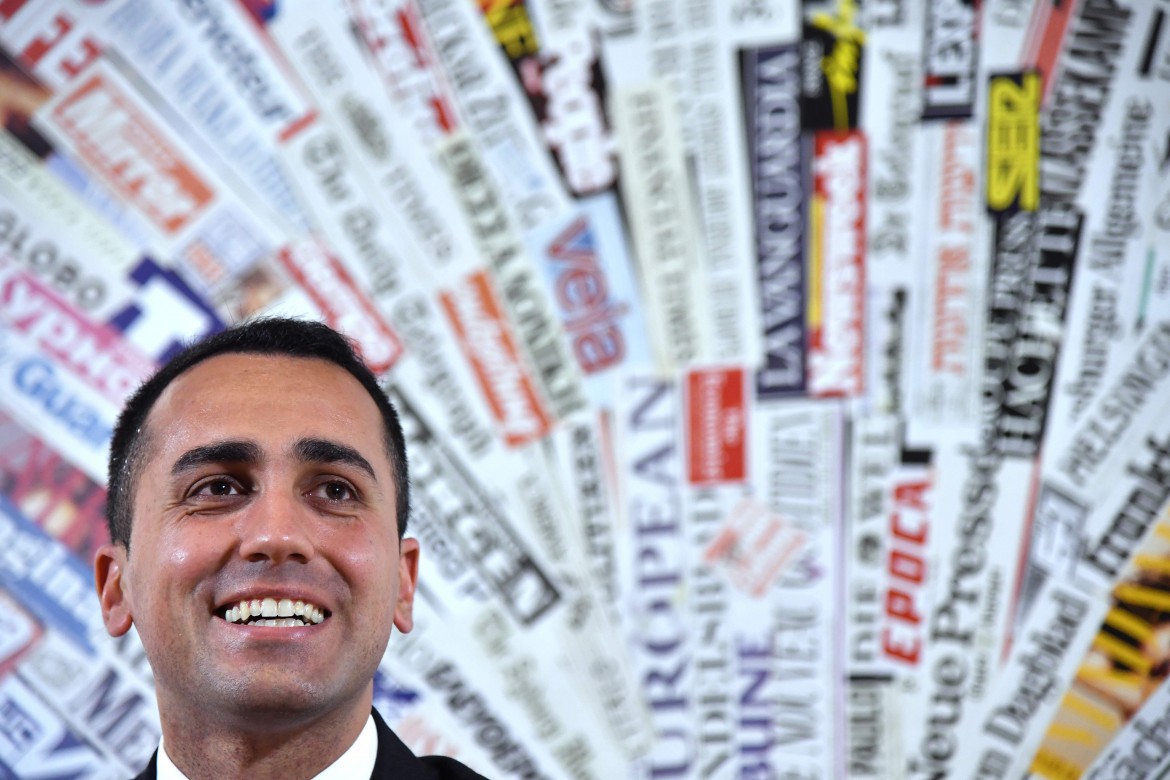Reportage
Italy’s de facto PM: ‘We aren’t afraid to go back to the polls’
The leader of the 5 Star Movement called a press conference and rejected a government of technocrats and consensus. “The citizens, when they voted for the M5S, were choosing a candidate for prime minister, a government team and a program.”

After the rebuff from the Democratic Party, Luigi di Maio, now in his second week as leader of the first political force in the country, went on the counterattack.
He summoned the foreign press and, in pure 5 Star Movement style, described the current situation as everyone agreeing on the issues, but quarreling about positions in a new government. On the one hand, he used the easygoing tone he has been employing of late, taking the edge off particular policy proposals and fully embracing the EU and Atlanticism. On the other hand, he put heavy constraints on the formation of a new government, giving a sort of ultimatum and rejecting any technocratic government across a broad parliamentary spectrum.
“There is no possibility of a technocratic government, or a government of everyone,” Di Maio said bluntly, as he claimed that the negotiations for the election of the presidents in the two chambers (which will take place in 10 days) are completely free of “any dynamics connected to a government.” For the political leader of the 5 Stars, it is simply unthinkable “to imagine another government team than the one chosen by the popular will.”
“A powerful mandate has been granted,” he claimed. “The citizens, when they voted for the M5S, were choosing a candidate for prime minister, a government team and a program,” which is why he will not allow any room for negotiation on the composition of the executive. The team will be the one presented before the election—take it or leave it. “Whoever wants to come forward, they should come with proposals, and not with requests for positions in government, ministers, high officials.” He added that his party is “welcoming debate on all the issues,” although, as he complained, “I haven’t heard a single proposal until now.”
Then, he unveiled M5S’s own proposals. They sounded reassuring enough as they were dutifully jotted down by foreign journalists (as of Tuesday, in an unusual move, the foreign press briefing was off limits to the Italian press). Speaking for the same party as Virginia Raggi on her firebrand campaign for mayor, or Davide Casaleggio (whom a journalist once had the inspiration to ask: “Excuse me, sir, who elected you?”), Di Maio is now keen to appear moderate and pragmatic.
“Our economic measures will always be aiming toward the stability of the country. We don’t want to meddle in the economic dynamics with political diatribes,” he said before aiming a barb at outgoing Minister Piercarlo Padoan: “I think it was very irresponsible to meddle in the relationship between Italy and Brussels by answering ‘I don’t know’ when asked about the future of Italy.” He accused the minister for trying to poison the well before going into the opposition. Indeed, “we are all called to act responsibly.”
He then said he considered himself a moderate, in line with the other parties that are governing in Europe: “We do not want to have anything to do with the extremist parties.” He says the M5S-brand of foreign policy will not isolate Italy because it intends to “remain in the EU and NATO,” and he only reserves the right to do what his predecessors tried: “Change the things that aren’t working.”
As regards the economy, Di Maio said that nowadays “everyone wants to go past the 3 percent limit” for the ratio of deficit to GDP, but he insisted that “we most like the idea of reducing public debt with growth-oriented policies.”
“The first trip I took as candidate for prime minister was to the US,” he recalled, shoring up his Atlanticist cred—even though he also said he supports the abolition of the sanctions on Russia “in the interest of Italy,” and explained that “as prime minister, I would not turn to Washington, or to Moscow. I would first of all turn to Brussels.”
When he was asked if he wouldn’t consider it to be a sign of inconsistency if MPs elected on the lists of other parties were to support his own government, he answered that “in this case, we aren’t talking about people actually switching parties.” Does he plan to use the Rousseau platform to ask for the approval of any deal made regarding a government program? It is a dry and ultimately paradoxical question, as that would clearly be somewhat out of proportion: a political force voted by 10 million Italians would submit to the opinion of the few tens of thousands who have registered on Casaleggio’s website. He dodged the issue: “First there must be a dialogue, then we will see how we will proceed.”
“We’re not afraid to go back to the polls”—that was his veiled threat. Then someone asked him if he was thinking of overturning the two-term limitation for elected public officials. He firmly denied it: “This rule is sacred.” But this means that, given the present situation, he could not himself run again for Parliament if snap elections were to be called, and he would have to ask dozens of 5 Star MPs to cut short their last allowed term in Parliament. This is a trap that, as political leaders fear, could end up changing the minds of even the ostensibly bravest of MPs.
Originally published at https://ilmanifesto.it/di-maio-no-al-governo-di-tutti-le-urne-non-ci-fanno-paura/ on 2018-03-14
